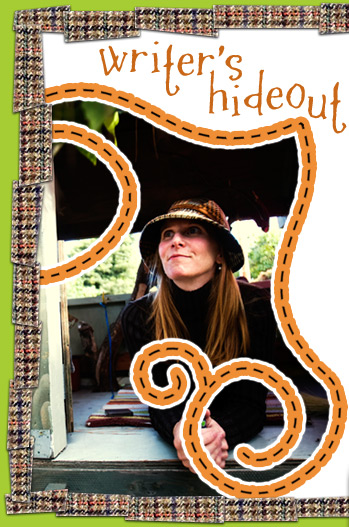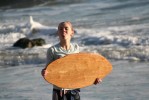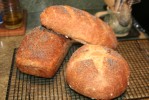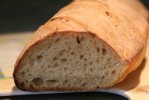
Dear Friends, mes amis, mes petits and mon cheri: You know I adore doing laundry. Truly. It is not a chore for me-I appreciate the swish of the machine-the clothespins for those sunny days--the rumble of the dryer-and even the lint that ensues. That is for the record.
I have several issues, however, that I thought I might address here and now, as we are all gathered, to help you understand some of the finer details I have come to appreciate as I launder your over and undergarments.
Firstly. As much as I love for you to walk out of our home each day wearing clean underwear-as much as I love for your panties to sparkle and exude an odor that is clean and fresh, with slight hints of citrus or lavender-I do not appreciate having to hand peel your dirty underwear from the inside of your jeans, or your pajamas, or your smelly soccer shorts. I do not appreciate their friendliness; two dirty articles of clothing intertwined. Please, uncouple the clothes, give them their own voice, their own place in the laundry basket, however difficult that is for you. Thank you for your consideration.
Secondly. Men. It is, I'm sure, partially my fault that I birthed a boy who is now almost identical in size to my husband. Even so, do not blame me for confusing your esteemed socks. I tried desperately to make this easy on all of us by gifting white sport socks to one and black to another. By purchasing black dress socks for the hubby and brown for the son. I figured you could borrow. But your tastes over time have merged and I am at a loss. I won't even mention the dilemma of the stripes. If the wrong socks are somehow present in your basket, be of good cheer. There are children in Africa without any. I'm happy to send yours to them if you gripe.
Thirdly. Les chausettes, once again. In the same line of thinking as the dirty pantalettes, I would prefer if you kindly would turn your own socks right side out before washing. They're stinky and I only touch them with my thumb and index finger. Which means, they're often washed inside out. After much research, all of the science PROVES that socks are cleaned much more thoroughly if they're washed right side out. Just a seed of thought to tuck behind your eyeballs and consider.
Lastly. If you don't like me, if you don't appreciate my bread baking skills, my tremendous way with folding, my red hair, or my delight at writing eloquent laundry manifestos, then you may freely do your own laundry. The machines are there. The soap. The buttons are fun to push. You might even find yourself drawn to it and embark on an adventure of suds and lavender scented sachets. You never know.
I appreciate your attentiveness, your willingness to open your ears, your hearts, your very nerves and capillaries. Beauty comes in many forms, even in clean and folded forms, and I love you.
END NOTE:
If you're six, and your name is John Ronan, then you are exempt from this speech. As long as you know where the laundry basket is located, which you do, then all I ask is that you disregard the whole part about doing your own laundry and never ever, jamais, push any of the washing machine buttons. Not until you're ten, in three years and two months. Pretty please, with honey on top.
Love,
Mom...
With a four-year-old in the house, there's a lot of laughter that fits into our day. He runs in circles and falls down from being too dizzy; we all laugh. It starts to rain on us as we dash into the grocery store, and we giggle at the raindrops on our cheeks and chins. At dinnertime, my daughter stabs her fork at a grape and it flies off the plate; we all grin, then double over in hysterics when she falls out of her chair as she reaches for the runaway... Simple humor is a healthy part of our days and keeps us from taking ourselves too seriously. We enjoy being a silly family.
But lately I've been noticing that children's picture book writers are going beyond the simple humor that little ones seem to most enjoy, and heading down the windy road of satire and sarcasm. My four-year-old and I visit the library each and every Tuesday, and the first books we pick are from the just purchased/new-to-the-library stack; I like the fresh, crispy pages that are still smudge free, and it's fun, from an author's perspective, to see what today's editors are working on.
Feeling a bit perplexed by some of the recent books we've encountered, I did some research on the use of sarcasm in children. After several days of poking my head into a variety of studies, the conclusion seems simple, and apparently undebated. Small children do not understand, use, or appreciate sarcasm. One psychologist, Penny Pexman who has conducted research in this field at the University of Calgary, writes, \"Our study suggests that five-year-olds are beginning to understand the simplest form of sarcasm and are getting better at it, but still by the age of eight they really don't find it funny...\"
It appears that the age range of when children understand, and use this form of humor is the one aspect that is debated. Some studies state that children as young as three show signs of understanding sarcasm, yet other researchers claim that it isn't until adolescence that the full force of sarcasm can be reached. I can personally attest to the fact that both my 13 and 15-year-olds have sarcasm completely figured out, but my four-year-old—and the other preschoolers that I hang out with? Not a chance.
Sarcasm is a sophisticated form of humor. The word \"sarcasm\" is derived from the ancient Greek, meaning \"to tear flesh, gnash the teeth, speak bitterly.\" Merriam-Webster defines it this way: \"a sharp and often satirical or ironic utterance designed to cut or give pain.\" A study done in 1978 by Sigelman and Davis describes sarcasm beautifully.
Sarcasm is a language behavior that occurs when speakers' intentions differ from their actual verbal messages. That is, a speaker thinks or believes one way, but says something different. Typically, a sarcastic speaker cues their true intent with nonverbal behaviors such as rolling eyes, shrugging, smirking, a sneering voice, or other features that say, \"I do not mean what I say.\" Adults hear the message and see the nonverbal cues that contradict that message and realize the speaker is being sarcastic. Adults have learned to believe nonverbal cues over verbal cues when the two cues conflict.
So, the broad question I'm grappling with is: Why are editors pursuing this form of humor for picture books? I can understand the use of snarky language when it comes to easy readers, or middle grade novels, but picture books that are meant for toddlers through 8-year-olds? I'm baffled...
Instead of singling out books that have struck a questioning chord with me, I'd like to mention two examples of newly released picture books that, in my mind, really work humor-wise for young readers.
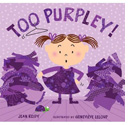 Too Purpley! by Jean Reidy, illustrated by Genevieve Leloup. This is a really silly, illustrative feast for the eyes about the various forms of dress one can choose (too purpley, too fancy, too polka-dotty...). What makes this book so fun, even for a little boy, is the young girl's companion, a pet turtle that is continually making funny faces or looking ridiculous. Kids get the visual humor in this book, that it's pretty silly to dress up a turtle in fancy or feathery clothes, or for a girl to wear an outfit that has stripes going in every direction possible. This is the perfect book for a 2 to 4-year-old girl who loves, loves, loves to dress up.
Too Purpley! by Jean Reidy, illustrated by Genevieve Leloup. This is a really silly, illustrative feast for the eyes about the various forms of dress one can choose (too purpley, too fancy, too polka-dotty...). What makes this book so fun, even for a little boy, is the young girl's companion, a pet turtle that is continually making funny faces or looking ridiculous. Kids get the visual humor in this book, that it's pretty silly to dress up a turtle in fancy or feathery clothes, or for a girl to wear an outfit that has stripes going in every direction possible. This is the perfect book for a 2 to 4-year-old girl who loves, loves, loves to dress up.
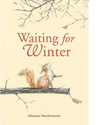 Waiting for Winter by Sebastian Meschenmoser is one of my favorite new books on the market. The artwork is superb, most pages being pencil drawings that are subtle and soft and whimsical, but the text is not subtle, it's even a bit boisterous, with a fair amount of exclamation points and outlandishness. The combination works and when the characters who have never seen a snowflake before try to figure out what one might look like, the humor unfolds, and... I just love it.
Waiting for Winter by Sebastian Meschenmoser is one of my favorite new books on the market. The artwork is superb, most pages being pencil drawings that are subtle and soft and whimsical, but the text is not subtle, it's even a bit boisterous, with a fair amount of exclamation points and outlandishness. The combination works and when the characters who have never seen a snowflake before try to figure out what one might look like, the humor unfolds, and... I just love it.
Some of my favorite funny books are now modern classics. Cynthia Rylant's Mr. Putter and Tabby books are wonderful for giggles; I just love the story when Mr. Putter is zinging pears with a slingshot over his home and onto Mrs. Teaberry's lawn. Felicia Bond also wrote a very funny picture book, titled Tumble Bumble. There's really no plot line, just a lot of fun... And there's always Dr. Seuss and his over-the-top characters and their stories...
Anyway, my guess is that the newly released picture books that have a fair amount of sarcasm in the text will probably gain some attention from adult readers, but I'm doubtful that a four or five-year-old would give these books a five star review. But, you never know what might strike a chord in the mind of a little reader. I was astonished recently when my adventurous, very boyish, machine-loving, Tom Sawyer-like child discovered Mousie Love. A romantic tale ALL about two mice falling in love... He “loves” it. Go figure...
Americans seem hard wired for speed. I remember learning to ski in high school, after quitting gymnastics. Some of my best friends were great skiers, and my first foray into negotiating the slopes was by being shoved, in an ever-so-friendly way, off the top of the mountain. After I somewhat got the hang of it, we would spend our ski days whizzing side to side like maniacs, competing down the slopes--seeing how long we could last without taking a break. Skiing was a frantic race to the bottom.
Then, long after, I spent several days skiing with an Italian family who lived in the Alps. They brought a picnic along, talked about the beauty of the day, of the mountains. They giggled and played games and sang while they leisurely carved mellow tracks in the snow. Sometimes they raced, but they also took breaks and sunned themselves--even the energetic teenagers. Skiing was not about making it to the bottom--it was about the journey to the bottom--a way to embrace a beautiful sunny day, a time to be together and enjoy the gifts that the mountain offered.
And it's not just skiing that Americans like to take at super speed. We eat that way--chomping our food in the car, in enormous gulps. We race in and out of grocery stores, always in a hurry, we buy faster and faster machines--computers that can connect to the internet in one second instead of two. We tap our feet when someone at the bank has a question and holds up the teller...
I'm worried that with all this racing, we Americans are going to zip through life like summer storms--blowing into town in an afternoon, throwing some lightning around--having never seen the place we're raining on. I'm worried that we're losing the ability to look into each other's eyes and really see or care what's there.
The bizarre paradox in this speedy game seems to be that we rush around so that we can then plop ourselves in front of the TV and eat bag after bag of Doritos. Or we sit in front of our computers uploading pictures onto Facebook for hours--did I run that red light today just so I might eat my microwaved dinner over my keyboard?
And new writers have this same tendency--of wanting their work to be finished in a day, and published the day after. I know I'm impatient in this department, but in my writing life, in my work as an editor, and in my personal experience as well, I've learned the importance of the word Slow. If you're a writer, I encourage you to slow down. The process of writing teaches us more than just about the work we're creating. It allows us to live life through the lives of another, to learn those lessons the characters need in order to grow, and to patiently find the best in our words.
My husband and I have been trying to fight this cultural paradox for our twenty years of marriage, and what a battle it is! A daily battle--me against driving too fast and liking barbecue potato chips way too much, and him, well, he's got it better figured out than I do.
I'd like to encourage my fellow Americans to join with me in slowing down. We've tried it long enough to know it's possible--and that life without a television can be rich indeed. One way I've slowed down this last year is by heading to the beach once each week to simply dig in the sand, or watch the plovers, or just walk. I've made a short video, using some of my photos from those times. I'd love to hear some ways--some Slow ways--that work for you...
Like a compass with the dial set to show North, I think about myself automatically, no matter which way I turn. I think I've gone a little over the edge... I think about how much I'd like some new shoes, and a pair of those funky smart wool socks (striped). I dream about back massages, and weekends away. I wonder when I'll get more time to write, and about that next great story that's rolling around in my brain and how it would make a great blockbuster movie... It's all about me, baby. All about me.
To combat all this me-speak, I'm embarking on a year-long experiment, one I hope will stretch and continue to pull me out of my cozy, homey, me-shaped hole. I know I don't have the energy to start a new organization that would change the world in one fell swoop, but I do know that I can make a little more space in my life for others. This idea has been percolating in a very slow and organic way. It feels right.
I love to bake bread; it's already something I do on a semi-regular basis, especially in the winter--so I've decided that at least three times a week, for an entire year, beginning January 1st 2010, I'm going to simply double up on my dough and bake more. I'll continue to bake for my family, but with twice the amount of bread coming out of the oven I'm going to give the other half away. The fun will be deciding on who to give it to. I think it will be different every time. I've been experimenting a bit, trying my hand at this sort of giving for the past several months, and already the results have been fruitful, and surprising.
Just last week some bread popped out of the oven and it was fairly late in the evening. Most people had already eaten. So I told my husband, \"I'm just going to walk out the front door and see what happens.\" I stepped onto the porch and a woman was walking by, talking on her cell phone. I yelled and waved like a crazy woman. \"Have you had dinner yet?\" She asked the someone on the cell to hang on and then looked at me with a sort of twisted, questioning face. I raised my eyebrows and smiled. \"Uh, no,\" she said. I ran down the brick walk to the street and popped the hot bread into her hand. \"Thanks,\" I heard her say as I sprinted back into the house.
Why not give a hot loaf of bread to a complete stranger walking by talking on a cell? Why not? I'd love to walk by someone's house and have them toddle out the front door and hand me a bag full of pomegranates. That'd be cool. (There I go thinking about myself again!!!) I'm hoping to start something new. This blog will be a journal of my baking--and of those people I meet and the many things I know they'll teach me. I can't wait until January first! I keep wondering why I'm waiting at all.
Oh, but I'm stuck. That's why I haven't launched this blog yet. I simply haven't come up with the perfect name...In the efforts to try and figure this out, I had my family help me brainstorm some name ideas. It was fun, but I'm not sure we nailed down anything useable. Help! You'll see below that I need your help.
First round of bread blog titles
Loving Your Neighbor (boring)
Baking Bread (can't get more boring than that...)
Got Bread? (Oh, that's original)
Baker's Daughter
The Dough Girl
Sour Mom (the kids loved that one!)
Give Away Your Dough (Ha!)
Got Dough?
Give Dough?
The Reluctant Baker (Love the word reluctant, but I can't remember the last time someone had to twist my arm to bake a loaf of bread...)
As you can see, we didn't make much headway with this first batch of names. Though I do think that Give Away Your Dough has some potential :) From this list we used the simple technique of writing any single word that might apply to this idea to help us find more options and talked about the purpose of the blog. The purpose being: to highlight the very act of giving and inspire others to do the same. The vehicle for the giving is a loaf of homemade bread.
Here are the words we listed: dough, bread, give, love, neighbor, peace, sourdough, flour, sourdough, loaf, crusty, crust, mom, knead, yeast, change, generous, gift, daily, small, year, oven, wheat, others...
Second round of bread blog titles:
From Dough to Crust and Back Again
The Return of the Crusty Queen (Ha!)
The Year of the Crust
The Dough Giver
The Dough Whisperer (That totally cracked me up... I do pray when I knead)
Loaves for Blokes
The Sour Mom (The kids really didn't want this one to go unnoticed)
Kneading for Others
Loaves for Love
Out of the Oven (I like this, but I don't want people to constantly think that I'm expecting another baby)
Knead Dough?
So, it's open season on votes. I desperately want your feedback. Please bend your brain to help me get this right. It would be one way you could give... to me...
Love you! Help me!




